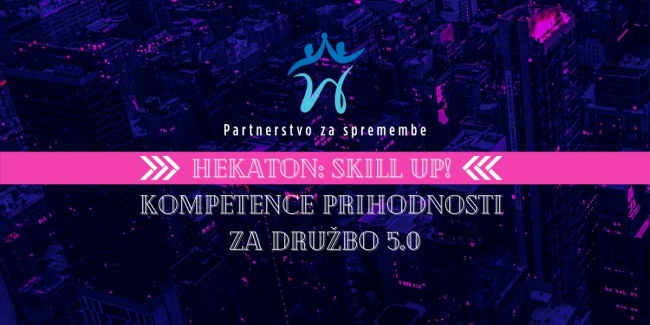“Slovenia can become the digital champion of Europe if only digital competencies and the digital economy were put higher on the agenda,” said keynote speaker Myladie Stoumbou, Regional Director, Commercial Partner Channel and Programs, CEE Multi-Country, Microsoft Corporation, at the hackathon Skill up! Competences of the Future for Society 5.0.
Within the Partnership for Change program, led jointly by the Ministry of Public Administration and AmCham Slovenia, and with the cooperation of the Knowledge Transfer Office of the University of Ljubljana and the Digital Sustainability Forum, we organized the Skill up! Hekaton – Competences of the Future for Society 5.0.
The audience was addressed by the Minister of Public Administration of the Republic of Slovenia, Boštjan Koritnik, who said that the national cooperation platform Partnership for Change has already written many success stories in the past seven years. “If we get to know and learn to understand each other, we can lay foundations for cooperation to co-create the right solutions, which are wanted by both, the state and the economy,” said the minister, adding that if we want to progress and move closer to society 5.0, we must be partners who work together and connect. The minister was wondering “How to reconcile the expectations of employers and educational programs?” and said that this will be difficult by merely re-coordinating the curricula, as it is also crucial to acquire the appropriate competencies and soft skills that you cannot learn from textbooks.
Digital knowledge as a priority and key development area
Barbara Domicelj, General Manager of Microsoft Slovenia and Vice President of AmCham Slovenia, expressed hope that Slovenia will be among the winners of digital transformation. She said that: “We are in a period when we have to prepare for the recovery of the Slovenian economy after the epidemic and decide how to live after. I am convinced that Slovenia has a huge opportunity to take advantage of all the advantages we possess,” and noted that Slovenia is among the countries where as many as a quarter of all jobs are endangered by automation. According to Barbara Domicelj, Slovenia has many untapped opportunities in the field of digitalization, and Microsoft wants to be a partner of Slovenian digital transformation, as they possess the necessary knowledge and experience.
Slovenia must put the digital development of the economy higher on the agenda
The keynote speaker at the event was Myladie Stoumbou, Regional Director, Commercial Partner Channel and Programs, CEE Multi-Country, Microsoft Corporation. As a major accelerator of digitalization, the epidemic has demonstrated the power of digital technologies and has put digitalization in Eastern Europe several years ahead. “We now see that digital skills are strengthening and that more than 40 percent of all companies are investing more in digitalization, new ways of working, and acquiring new competencies,” said Microsoft’s Regional Director, noting that a more digitalized world also leads to jobs transformation.
And where in this story can Slovenia position itself? “Like other European countries, Slovenia will receive funds from the EU Recovery Fund, which will make Slovenia greener, more resilient, and more digital,” said Myladie Stoumbou, pointing out Slovenia’s advantages as an exceptional strategic position, a good education system, and one of the world’s largest shares of artificial intelligence scientists per capita, exceptional readiness for the future of work and the economy, which is largely composed of small and medium-sized enterprises and start-ups, which with their agile methods and implementation of new technologies will become the driving force of economic development. Slovenia can impose upon all of these advantages if it puts the digital development of the economy higher on the agenda, ensures better access to e-services, and provides better digital education for its citizens. Finally, she added: “The crisis has had a great impact on our lives, but it has also been a great accelerator. For Slovenia, this can be a great opportunity for modernization, digitalization, automation, and innovation.”
